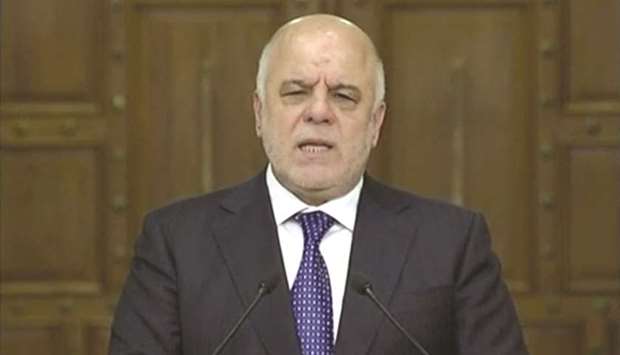Haider al-Abadi spoke out in a televised address shortly after Kurdish leader Massoud Barzani said the Kurds’ partnership with Baghdad had failed, and that the plebiscite would proceed as planned today.
Abadi said that taking a unilateral decision to stage a referendum affected both Iraqi and regional security, and was “unconstitutional and against civil peace”.
“We will take the necessary measures to preserve the unity of the country,” he said but without elaborating.
He added that “we will not permit anyone to play with Iraq and not pay the consequences”. Earlier, Barzani urged his people to turn out and vote today.
“The partnership with Baghdad has failed and we will not return to it,” he said.
Barzani has resisted pressure from Baghdad, neighbouring states and Washington to call off the referendum and negotiate a new deal.
“The referendum is not for defining borders or imposing a fait accompli.We want a dialogue with Baghdad to resolve the problems, and the dialogue can last one or two years,” Barzani said of disputed zones such as oil-rich Kirkuk.
Iraq’s neighbours Iran and Turkey strongly oppose the referendum. Tehran upped the pressure yesterday, saying it had blocked all flights to and from Kurdistan at Baghdad’s request.
Washington and many Western countries had called for the vote to be postponed or cancelled, saying it would hamper the fight against the Islamic State group.
But in regional capital Arbil, Barzani’s political heartland, Kurdish flags were flying everywhere yesterday.
Most in the city said they would vote, but some also feared the possible consequences.
“We look forward to hearing what the situation will be after September 25, as most Kurds will vote for independence to fulfil our dream of an independent state,” said labourer Ahmad Souleiman, 30.
“What we’re afraid of is that our enemies have evil intentions towards us.”
Turkish Prime Minister Binali Yildirim again denounced the referendum yesterday, saying it would “further fuel existing instability, lack of authority and chaos in the region”.
Some 5mn Kurds are expected to vote in the three provinces that have since 2003 formed the autonomous region of Kurdistan but also in territories disputed with Baghdad such as the oil-rich province of Kirkuk.
While an independent homeland has long been an aspiration in the Kurdish diaspora, the ethnic group’s two main parties in Iraq differ on how to make it a reality.
Barzani’s Kurdistan Democratic Party (KDP) and the Patriotic Union of Kurdistan (PUK) of Jalal Talabani, a former president of Iraq, are at opposite ends of the spectrum politically on the issue.
The PUK has backed an alternative plan put forward by the United Nations, and supported by Washington, for immediate negotiations on future relations in exchange for dropping the referendum.
In Sulaymaniyah, the PUK-controlled second city of the autonomous Kurdish region, enthusiasm for the vote was muted.
“I will vote ‘no’ tomorrow because I’m afraid of an embargo on the region, of civil war with the Hashed al-Shaabi, and waking up and seeing Turkish soldiers patrolling,” said 30-year-old teacher Kamiran Anwar.
The most sensitive sticking point is Kirkuk where there was a run on food supplies in the city Saturday as residents stocked up in case of post-referendum trouble.
Home to Kurds, Arabs and Turkmens, Kirkuk is disputed between the federal government and Iraq’s Kurds who say it is historically theirs.
They argue that the late dictator Saddam Hussein chased them out.

